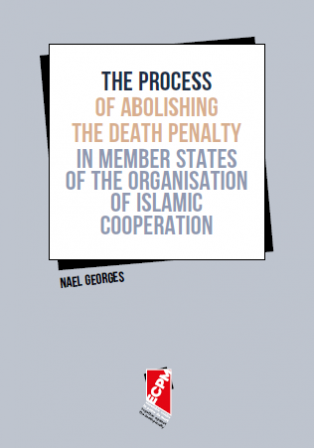The process of abolishing the death penalty in member states of the Organisation of Islamic Cooperation (OIC)
26 November 2020
As the 47th session of the Council of Foreign Ministers organised by the Organisation of Islamic Cooperation (OIC) is being held in Niamey, Niger, on 27 and 28 November 2020, ECPM and Nael Georges publish the study The process of abolishing the death penalty in member states of the Organisation of Islamic Cooperation.
Available in English, French and Arabic, this publication presents the results of interviews and research carried out in 2020, providing a better understanding of the processes leading to abolition of the death penalty in OIC member states. It is accompanied by a summary and an interactive map, which can be consulted below.
The OIC has 57 member states, spread over 4 continents : it is the largest international organisation after the United Nations. Recent decades have seen the Organisation of Islamic Cooperation (OIC) member states open up to universal values of human rights. This is also reflected in the slogan of this 47th session of the Council of Foreign Ministers, "United against terrorism for peace and development".
The abolition of the death penalty within the OIC has not yet been achieved, but the intervention of parliamentarians, civil society actors or other politicians in favour of abolition has played and will play a decisive role. Abolition processes are slow, difficult and sometimes risky. Nevertheless, there are many reasons to hope, especially when we see the growing number of Muslim states that have become abolitionist.
Out of the 57 OIC member states, 19 have abolished the death penalty (for all or ordinary crimes), 14 maintain a moratorium on it and 24 are retentionists (see our interactive map below). Abolition is possible and this study demonstrates this through specific examples of states that have made this choice. It is a valuable tool to accompany them towards abolishing the death penalty and discrediting popular misconceptions.
- Some objectives
- To preserve and promote the lofty Islamic values of peace, compassion, tolerance, equality, justice and human dignity ;
- To contribute to international peace and security ;
-To promote human rights and fundamental freedoms, good governance, rule of law, democracy and accountability in member states in accordance with their constitutional and legal systems - Some priorities from the OIC 2016-2025 Action Plan
- Peace and security
- Counter-terrorism
- Human rights and good governance - Diversity of member states: Islam is the official religion in some, others are secular ; demographic and political and legal aspects of Islam differ between states.
- Most OIC states adhere to the main international conventions of human rights
- All have ratified the Convention on the Rights of the Child
- 14 States have ratified the OP2
- Only 5 States have not ratified the ICCPR
- 25 September 1969 : foundation of the Organisation of Islamic Conference (OIC) following the al-Aqsa Mosque arson attack
- March 1970 : first Conference of Ministers of Foreign Affairs and creation of a general secretariat
- March 1972 : drafting of the OIC Charter
- December 1983 : adoption of the Dhaka Declaration on Human Rights in Islam
- 5 August 1990 : adoption of the Cairo Declaration on Human Rights in Islam
- 2011 : the OIC changes its name to become the Organisation of Islamic Cooperation.
- Muslim-majority states : Albania, Azerbaijan, Burkina Faso, Côte d’Ivoire, Djibouti, Guinea, Kazakhstan, Kyrgyzstan, Uzbekistan, Senegal, Turkmenistan, Turkey, Chad
- Muslim-minority states : Benin, Gabon, Guinea-Bissau, Mozambique, Togo, Suriname







